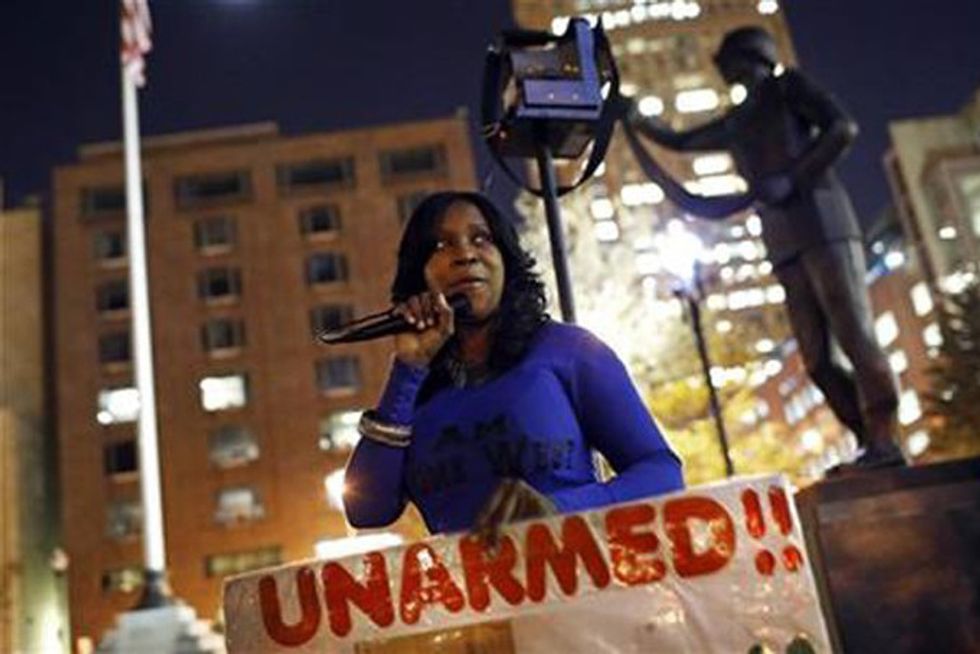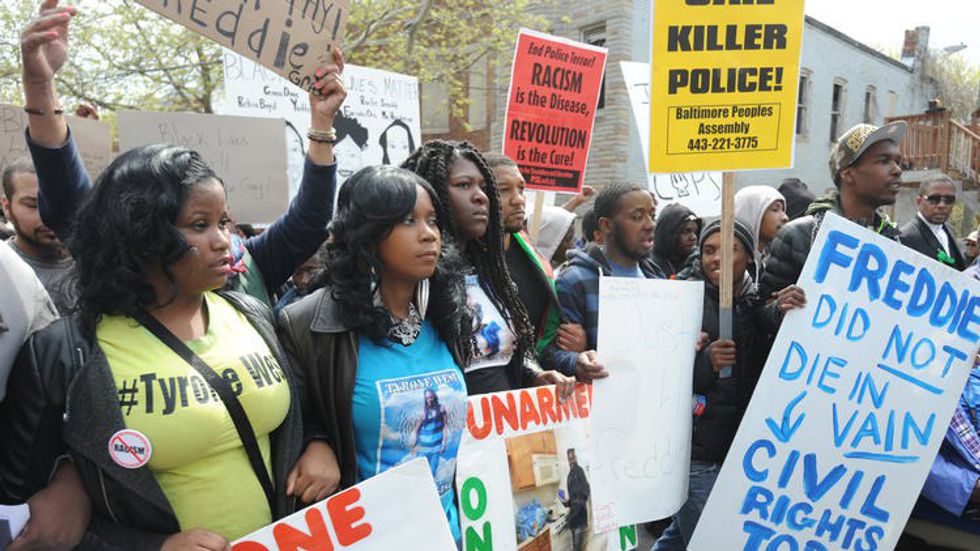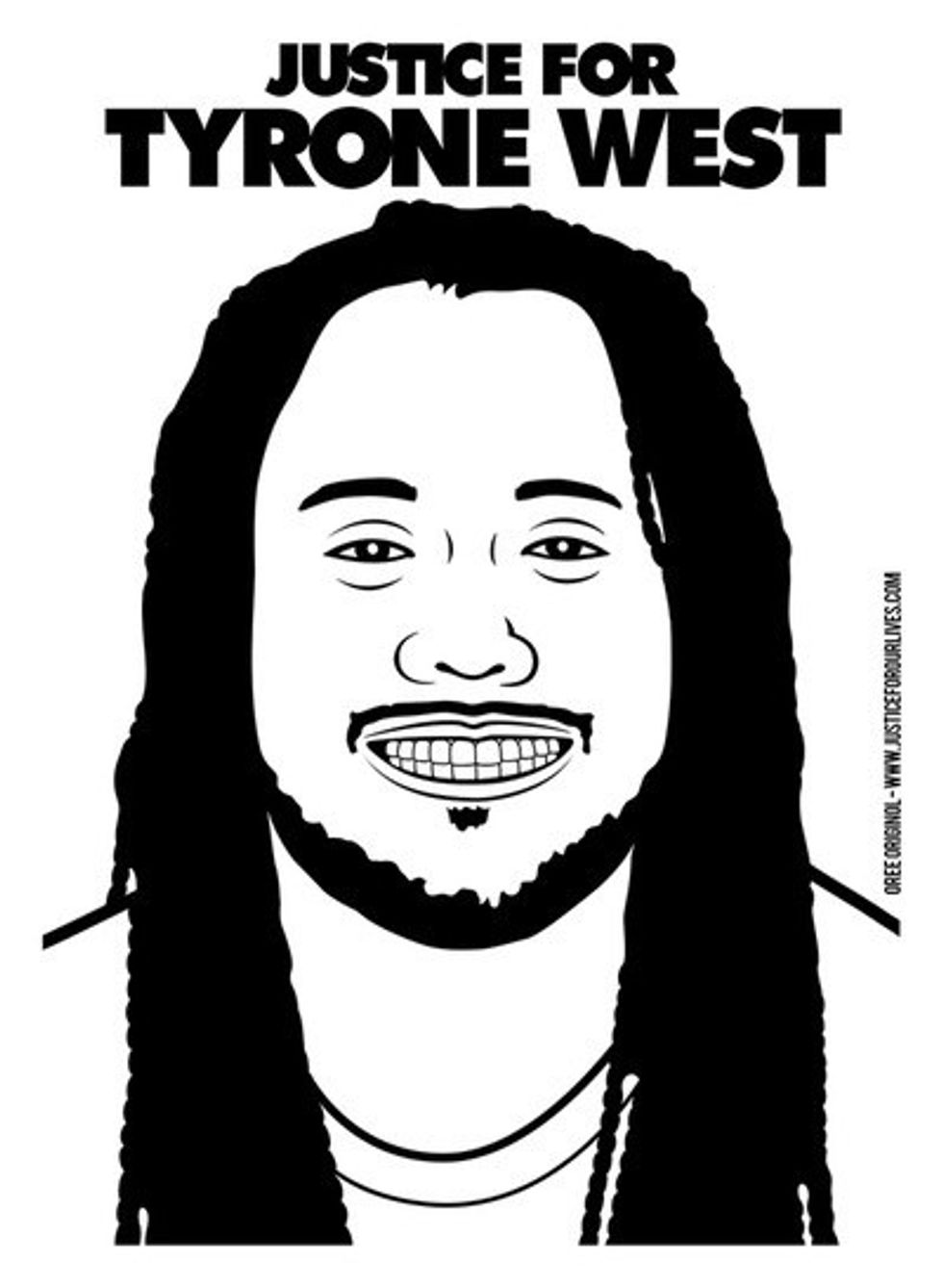Freddie Gray, Trayvon Martin, Sandra Bland, Eric Garner -- these are names you are probably familiar with. They are all people who were lost too soon to police brutality, and their names have become synonymous with the Black Lives Matter movement. Activists have spread their stories in hopes of finding justice, and to illustrate the destructive nature of mass incarceration, the War on Drugs, and police overreach.
But for every name that makes national headlines, there are victims of police brutality who go largely unnoticed by the general public.
Tyrone West is one of them.
A 44-year-old father, uncle, and brother from Baltimore, Tyrone West was killed during a traffic stop by city police officers in the summer of 2013. Every week since, his family and supporters have been gathering on Wednesday evenings to demand that his case be reconsidered and the officers in question convicted. West’s sister Tawanda Jones leads these weekly demonstrations, and has found herself in a position of leadership in the Baltimore activism community. Pre-school teacher by day, fierce activist by night, Jones dedicates her spare time to finding justice for her brother, and supporting all victims of police brutality. I had the opportunity to sit down with her, and gain her perspective on all that’s happened in the past four years.
Walking into Tawanda Jones’ home, the front alcove is completely decorated in her brother Tyrone’s West’s artwork – impressive artwork. Several feature historic black figures such as Barack Obama, while others depict family members such as Jones herself.
An example of Tyrone West's artwork.
While the most troubling and controversial chapter of Tyrone West’s story comes at his death, it is important to recognize that he lived an entire 44 years of life before July of 2013. He is not defined solely through his death, but rather was a fully-fledged person who died at a tragically young age.
So who was this person?
“My brother Tyrone was the glue to our family,” Jones said. “He loved telling jokes. Retelling you I can actually hear him laughing. It wasn’t a real loud laugh, but it was one that you knew.”
Along with being a talented artist, West was passionate about fitness. “He always emphasized the importance of eating right and exercising. He would take walks every morning, from East Baltimore to West Baltimore,” Jones said. “He liked helping with my grandmother, helped her exercise.”
“He liked to take care of the family. He was a father, he was my older brother and my best friend,” she said. Family was always West’s priority.
That evening of July 18th, Jones experienced something she previously had thought only happened to twins. Though nobody ever called Jones or her family to inform them of West’s death, she knew immediately when her brother was hurt. “The night he was murdered instantly I felt his pain. Exactly at 7:00… I’ll never forget, I felt a sharp pain on the right side of my neck,” she said. “It was so bad I thought I was having a stroke.”
The entire left side of her body went numb, and she and her fiancé were ready to take her to the hospital. However, ten minutes later the pain completely disappeared. “Then the pain was followed by this sick nagging feeling that something had happened to my brother. I felt like in that moment my whole universe had just turned. I started crying, my fiancé thinking I’m crazy... And I say – ‘oh my gosh, something happened to Tyrone’…So I started calling him. He didn’t answer, so I knew.”
The family started making phone calls immediately – to the Homicide Unit, the Baltimore Police Department, local hospitals – but nobody provided them with answers. “We literally went down to Homicide the same day he was murdered. We’re tracking down people who should have been calling us,” Jones said.
At 10:00 PM, the family’s suspicion was finally confirmed when they saw West’s death reported on the news. “I look on the television and see my brother’s dead body on the gurney...I see witnesses crying, saying they didn’t have to beat him like that, that they never saw something like that happen,” she said. “I could not comprehend that kind of pain. I couldn’t catch up with reason or understanding. It just felt like I died.”
What precisely occurred that day is hard to know, but we can use eyewitness accounts as well as the police report to get an idea.
According to the police report, West was arrested during a traffic stop on July 18, 2013, for backing down the street and into an intersection. When officers asked West to get out of the car, they supposedly noticed a bulge in his sock. They suspected it to be drugs. From here an unclear struggle ensued, and officers tackled West to the ground. According to eyewitness accounts they beat him severely, and an officer sat on his back. West died while handcuffed on the ground. There were reportedly several Baltimore City police officers (Nicholas David Chapman, Jorge Omar Bernardez-Ruiz, Matthew Rea Cioffi, Alex Ryan Hashgen, Eric Maurice Hinton, Danielle Angela Lewis, Derrick Dewayne Beasley, and Latreese Nicole Lee) and one Morgan State University officer (David Lewis) involved.
Jones doesn’t believe that West was carrying drugs. She says she remembers him wearing ankle socks that day, where he wouldn’t have been able to hide a bag. "I am a hundred percent sure my brother had no drugs on him. I just left him, so I know that for a fact...I can put my life on it," she said. "Let's be clear, if they had found any drugs on him or in my vehicle, I would never have been able to get my vehicle back."
But regardless of what you believe, it is important to note that the punishment for illegal drug possession is not immediate execution, and that West was unarmed and handcuffed on the ground when he died. Jones also believes that the media has been misrepresenting West’s interaction with the police officers as a “struggle.” “My brother was struggling to survive,” Jones said. She believes that any struggle between him and the officers was out of self-defense.
It is also important to note that one of the same officers who was involved with West’s killing (Bernardez-Ruiz) also harassed Darrel Harris only one day before. Officers Chapman and Bernardez-Ruiz were also involved in the brutal beating of Abdul Salaam on July 1st, only a couple of weeks before West was killed. Salaam won a civil suit against the police officers who injured him, and has expressed that these men should have been removed from the streets before they could even come into contact with West.
Tawanda Jones leads a West Wednesday demonstration.
The police claimed that Tyrone West was a John Doe. “What came to my mind frame was…something’s not right. For one, they didn’t call us. He was driving my vehicle -- nothing was wrong with my vehicle. We made sure that… everything was working sufficiently,” said Jones. “How is he a John Doe when he has his driver’s license and his credit card…with him? How is he a John Doe when you know the car that he’s driving…has a registry that has ‘Tawanda Jones’ on it? You killed him,” she said.
When officials finally came to her house to have a conversation, none of her questions were answered. Though West’s autopsy report would not be released for another five months, the questions the officials posed were in line with the story they would later tell regarding his death. “It was almost as if they walked in with what they wanted to say,” Jones said. Officials asked questions such as, “Did Mr. West have any heart problems? Could he have been affected by the heat?” etc. West’s family assured them that he never had any of these health issues, and Jones offered to send the Homicide Unit a copy of the doctor’s report he had gotten at his physical check-up just a week before. They said it wouldn’t be necessary.
“So the very next day we were out in the streets demanding answers,” Jones said. This was the birth of West Wednesdays, and – little did they know – an act of resistance that would continue for over 190 weeks. Suddenly, Ms. Tawanda Jones found herself placed in a position of leadership for activism in Baltimore. You can still find a dedicated group of activists meeting every Wednesday to demand justice for Tyrone West. They change locations every week in hopes of garnering more attention.
“Something registered inside of me...I need to turn this pain and frustration into something positive,” she said. In order to power through she understood that she needed to reach out. “I need to bring myself to a place where I can get counseling and help to know what triggers me. I need help.”
So Jones started getting counseling. “I’m a Christian woman and I believe in God. The pain was so real it tested my faith. How could [God] allow something this vile to happen?” she said. “But God told me: ‘You’ve got work to do.’ The work that I see God wants me to do is to…wake people up; make people aware of how corrupt this system is,” she said.
“We know bad things happen to good people, but I used to think: ‘well if you’re not breaking the law, how would you come into contact [with an officer] in a bad way?’” Jones said. “I was involved with a police officer for five years before my brother was murdered, so I know what it’s like to be on the flip side,” she said. “I used to wonder -- will my person come back to me? So I know how that feels.”
However, she realizes that there is a system of oppression in place. “These are not isolated incidents by far,” she said. “Yes, it’s about Tyrone West, but this is bigger than Tyrone West. It didn’t start at my brother and it didn’t stop at my brother.”
Jones believes that the media plays one of the largest roles in continuing the destructive narratives which make these murders possible. “They can make innocent people look guilty and guilty people look innocent…There’s this pattern of practice, what they do to dehumanize the victims. And it’s mainly African Americans and Latinos. Now if it’s someone Caucasian, they don’t do as much of that dehumanizing. They have this conversation of mental health issues. But when they’re black it’s ‘oh, they’re a thug,’” she said. “When you start hearing all these stories, be your own conscious consumer.”
It appears that there are some who do not approve of Jones’ activism work. “I've never experienced my car getting so vandalized. My tires have been slashed,” she said. Her car tires have been slashed so frequently that the West Wednesday community had to start a tire fund for her. “That’s the reason why I moved,” she said. However, even since moving to a different neighborhood, Jones has felt unsafe. She has had some unsettling experiences, such as strange men following her, trying to break into her house. She has also seen police officers standing outside her home, keeping watch, for no apparent reason.
A Black Lives Matter protest in Baltimore. (Credit: The Baltimore Sun.)
The police autopsy report claimed that West "died of Cardiac Arrhythmia due to Cardiac Conduction System Abnormality complicated by Dehydration during Police Restraint," and that another contributing factor could have been "the extreme environmental temperatures." Basically, they claim that West died of a heat-induced heart attack. The family of Tyrone West believes that this is false.
The police autopsy report took longer to be released than is typical. “It took them six months to do it. We had to bury my brother without a death certificate. So that made me really scratch my head,” she said. There were also no autopsy photos released with the report, which is unusual. “No autopsy pictures? You do an autopsy and the only photos you can provide are the ID photos?” she said.
But if the police refused to release photos, Jones was going to get her own. “I made sure to ask the funeral home for time with my brother,” she said. Before he was buried, Jones went through the painful task of photographing her brother’s body, so that she would have evidence of her own. “It was horrible,” she said. “I’m seeing boot prints, foot prints. And you’re saying that this man died of a heart attack?”
Only days after West was killed, Jones experienced something strange relating to his ID. On the 23rd, Jones gets a call from West's landlord, informing her that his apartment had been broken into. When she investigates, "[it] looks like his house was raided," she said. "It looks like someone was looking for something, because all the cabinets were open." West's belongings were moved onto the sidewalk in front of the house, and neighbors had been taking things, thinking they were free. This confused Jones, because "what robber...breaks into someone’s house, and everything you want you leave on the lawn?"
"And then the interesting part…as I’m walking up the steps, something just told me: look down," Jones said. She found West's ID on the ground, as if somebody had dropped it by accident. This was especially curious, because the police's reports regarding West's ID had been inconsistent. The original police report stated that West provided his ID, and yet he was later claimed to be a John Doe case. "So I held onto his license," she said. This begs the question: who was in West's apartment with his ID, and why?
In 2014, Mayor Stephanie Rawlings-Blake commissioned an independent police review, and concluded that while officers may have made mistakes leading to “chaos”, they did not use excessive force. The review did note that, "the officers involved departed from some BPD policies and training and made several tactical errors that may have extended the length of the physical encounter, compromised officer safety, and potentially aggravated the situation."
The West family filed a federal lawsuit. To collect more evidence that West was murdered, Jones and her family raised the funds to complete an independent autopsy. Conducted by Dr. William Manion, who is the chief of pathology at Memorial Hospital of Salem County in New Jersey, the new report concludes that West was suffocated, and that his death was unrelated to heart or heat conditions. "I do not believe that the cardiac conduction system abnormality made any significant contribution to Mr. West's death," Manion wrote. "There is no evidence of cardiac disease, fainting or sickness due to any cardiac conduction system abnormality prior to his death." The report concludes that, in the end, “the main cause of death is the fact that he was restrained in such a way that he was unable to breathe." The report calls this “positional asphyxia.”
This directly contradicts the autopsy released by the Baltimore Police Department, and is in line with the family and eye witnesses’ claims. Tawanda Jones and the Tyrone West Coalition hoped that this new evidence would prompt Baltimore City State’s Attorney Marilyn Mosby to reopen Tyrone West’s case, but she declined to do so. Jones has tried repeatedly to meat with Attorney Mosby, and each time this request has been denied.
There are several unanswered questions surrounding Tyrone West's death and events which have followed. One of the most bizarre situations, which even Jones doesn't quite know how to interpret, came as West's body was exhumed for the independent autopsy. First, Jones was under the impression that she would be able to see her brother's body when he was unearthed. She asked ahead of time when the funeral home would remove his casket from the ground, and purposefully came early so that she could bear witness. When she arrived early, his casket was already removed. "We showed up early, and he was already dug out," Jones said. "I’m wondering when they’re going to have us identify him." But they never did.
Then in the second autopsy report Jones noticed something peculiar. "They said he had a yellow shirt [on]," Jones said. This was confusing and upsetting to her, because they had buried him in a black shirt. She said they had specifically chosen this shirt because "I knew my brother loved black." Why was he reportedly dressed in yellow? Who would have changed his shirt, and why was the family never informed? These are just more bizarre question yet to be answered.
The Department of Justice released a scathing report in 2015 after a careful investigation into the Baltimore Police Department, including observations of patterns of racism and abuse within the city. The report stated: “We found that BPD has engaged in a pattern or practice of serious violations of the U.S. Constitution and federal law that has disproportionately harmed Baltimore’s African-American community and eroded the public’s trust in the police.”
Just this month Police Commissioner Kevin Davis announced that plainclothes policing (where police officers wear ordinary clothing rather than uniforms) will be coming to an end in Baltimore. This is a result of federal indictments of seven Baltimore City police officers who took advantage of their positions by collecting money for overtime they never worked, among other things. Davis said that plainclothes units have displayed a "cutting corners mindset" which has resulted in a disproportionate amount of complaints, and warrants eliminating the practice. The police officers who pulled Tyrone West over on July 18th, 2013 were plainclothes officers.
Baltimore reached a consent decree shortly before Trump’s inauguration, outlining the ways in which the city and police department plan to enact change. But does Jones have hope that this will be a tipping point towards justice?
“Not at all,” she said. “You think 227 pages are supposed to solve our problems? Something that’s been going on for decades?”
Jones believes that the only way to promote justice is to prosecute officers who already have records of abusing their positions of power.
So what can you do?
“Support us whatever way you think you can. Because when you’re helping, you’re doing a kind act. Talk to these people in power. Use your privilege and let them know they’ve got to stop. Sometimes it’s not what you know, it’s who you know,” Jones said.
“Stand out there and support West Wednesdays,” she said. “Support anybody who’s going through what we’re going through.”
If you’d like to start attending West Wednesdays, you can follow Justice for Tyrone West or Baltimore Bloc on Facebook, which post the weekly locations. You can also comment on this article, and I will try to respond with the location.
.

























